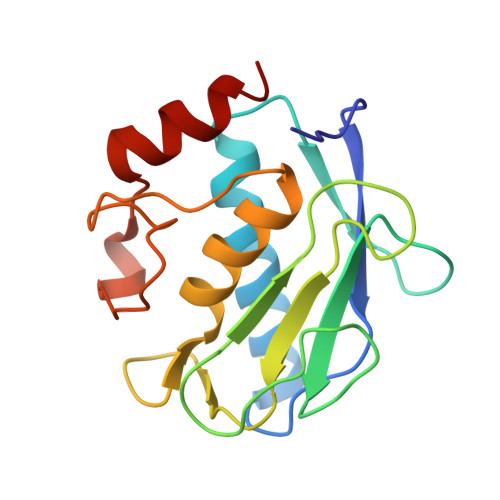Exploring the subtleties of drug-receptor interactions: the case of matrix metalloproteinases.
Bertini, I., Calderone, V., Fragai, M., Giachetti, A., Loconte, M., Luchinat, C., Maletta, M., Nativi, C., Yeo, K.J.(2007) J Am Chem Soc 129: 2466-2475
- PubMed: 17269766
- DOI: https://doi.org/10.1021/ja065156z
- Primary Citation of Related Structures:
3F15, 3F16, 3F17, 3F18, 3F19, 3F1A, 3LK8, 3NX7 - PubMed Abstract:
By solving high-resolution crystal structures of a large number (14 in this case) of adducts of matrix metalloproteinase 12 (MMP12) with strong, nanomolar, inhibitors all derived from a single ligand scaffold, it is shown that the energetics of the ligand-protein interactions can be accounted for directly from the structures to a level of detail that allows us to rationalize for the differential binding affinity between pairs of closely related ligands. In each case, variations in binding affinities can be traced back to slight improvements or worsening of specific interactions with the protein of one or more ligand atoms. Isothermal calorimetry measurements show that the binding of this class of MMP inhibitors is largely enthalpy driven, but a favorable entropic contribution is always present. The binding enthalpy of acetohydroxamic acid (AHA), the prototype zinc-binding group in MMP drug discovery, has been also accurately measured. In principle, this research permits the planning of either improved inhibitors, or inhibitors with improved selectivity for one or another MMP. The present analysis is applicable to any drug target for which structural information on adducts with a series of homologous ligands can be obtained, while structural information obtained from in silico docking is probably not accurate enough for this type of study.
Organizational Affiliation:
Magnetic Resonance Center (CERM), University of Florence, Via L. Sacconi 6, 50019 Sesto Fiorentino, Italy. ivanobertini@cerm.unifi.it

















